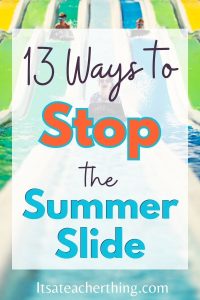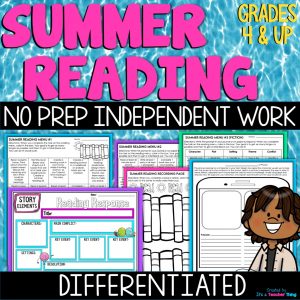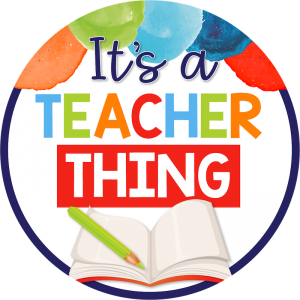Summer Slide is a term that refers to the learning loss students experience over summer vacation, and it’s a real thing. Learn 13 easy ways parents & teachers can boost student learning during summer vacation and help prevent the summer slide.

1. Reading challenges can prevent the summer slide
You can do this at home, in class, or oftentimes local libraries will have a reading challenge that may offer a bit more motivation for students. Set a reading goal for the summer and create a reading record page to track progress. Students can aim to read a certain number of books or pages, articles, short stories, etc. by the end of a specific period.
Check out these no prep reading choice boards that will help challenge students to read fiction, nonfiction, poetry, articles, etc. You’ll even find graphic organizers & fun recording pages to motivate students to read & respond to their reading.
2. Start a Friends/Family Book Club
Choose a book to read together and schedule regular meetings to discuss the story, characters, themes, etc. Being able to discuss a book with students is a fantastic way to build a relationship. Add in tea and cookies when you have a meeting, and you’ve created a fun event that your students will continue to look forward to.
Here’s a Book Club packet that has everything you need to start book clubs. It’s meant for classrooms, but works just as well with a single group. Book clubs can be a fun way to share thoughts and insights. This blog post explains why books clubs are a great classroom choice.
3. Be aware of what students are reading
Many times students will pick books that are too difficult. In these cases, you can try to find an audio version that students can listen to while reading the selection, which helps increase reading fluency. Read this blog post on 6 ways to improve reading skills.
How can you tell if a book is just right?
Have your students read aloud to you when they begin a new book. This will clue you in to whether they are missing a lot of words or running words together, which can reduce meaning, or other cues you’ll notice. Ask questions to see if they are getting the gist of the book.
I always give students an option to abandon an independent reading book if it proves too challenging, too easy, or just plain boring. However, you need to be careful here because it’s also important for students to struggle through tough parts, which builds stamina and reading skills.
4. Reading aloud to students increases motivation
Reading Aloud to your student or group is a great way to motivate students and inspire further reading. Reading aloud reduces hurdles for students & helps with understanding vocabulary, plot, characters, etc. Students are more likely to successfully complete a book when frustration is reduced. AND…if you start a series, your student will most likely want to read the sequel.
5. Encourage students to read aloud
Encourage students to read aloud to younger siblings, students, or relatives. Reading aloud is a great way to improve fluency and build confidence in reading skills.
6. Genre exploration can help prevent the summer slide
Introduce students to different genres they may not have explored before. Provide a list of genres such as mystery, fantasy, historical fiction, or science fiction, and let them choose books from each category to read. Think about reading aloud from different genres so your students get a sense of how genres differ from one another and which ones appeal to them.
7. Create a reading bingo sheet
Make reading bingo sheet with various reading prompts or themes. Students can cross off the squares as they complete different reading challenges, such as “Read 10 poems by the same author” or “Read a book by a new author” or “Read a mystery book.”
8. A visit the local library can prevent the summer slide
Encourage students to visit the local library regularly. They can explore different sections, borrow books, and participate in library events or summer reading programs.
9. A reading journal is an effective tool
A reading journal is where students can write about the books they read. They can include summaries, favorite quotes, character analyses, or personal reflections on the story. You can create one or buy a composition book. Give students an option to personalize their own.
Add sections by using sticky-notes that hang over the edge. Tape them to the pages that divide sections and then write the section title on the sticky note. Taping over the portion that hangs out (after you write on it) helps with durability. You can add sections like Fiction, Themes, Characters, Settings, Conflict, Resolution, Figurative Language, Summaries, Main Events, Connections, Nonfiction, etc.
10. Do an author study
Choose an author and read multiple selections by that author. Students can learn about the author’s writing style, themes, and recurring characters. They can even research the author’s background and read interviews with this writer.
11. Book-to-movie comparisons are motivating
Try this first with an engaging short story that also has a movie or television version. Classics may work best. One of my favorites is “All Summer in a Day, ” by Ray Bradbury. It has a movie you can find online, which provides a great comparison between author choices and screenwriter choices, but also between the images we create on our own and what the director chose to portray. These are fun to critique & discuss similarities, differences, & preferences. Make it a fun event!
12. Short stories may help increase reading motivation
Sometimes a novel or entire book is just too long for students. You can find short stories online, but you can also ask teachers if they have any old anthologies. Shorts stories might be just the ticket to increase reading skills and reading motivation.
Here’s a list of recommended short stories for middle schoolers.
Here’s a list of recommended short stories for 3rd-5th graders.
Here’s a list of recommended short stories for 5th graders.
13. Create a reward system to help prevent the summer slide
Ask students to pick from a selection of rewards and even pick the goals for earning the reward. For every book they read (or number of pages they read and discuss with you), they can earn points or rewards, such as stickers, bookmarks, or small prizes.
Some options may include going to to a thrift store or book store to buy a book, go to the movies or the swimming pool, go out to lunch, etc. Whatever you choose, make it motivating for the student.
Encouraging regular reading habits over the summer will help students maintain their reading skills, prevent learning loss, and help stop the summer slide!
Pin this blog post for future reference!




Leave a Reply